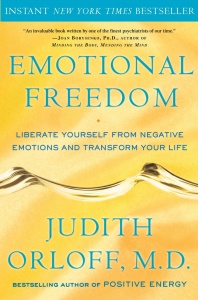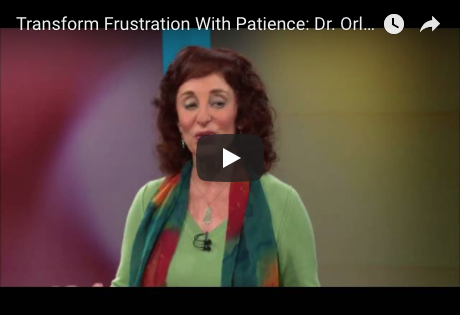Are you an empath? Take the test here to determine your empath score.
As a psychiatrist, I feel strongly that letting go of resentments, a point I emphasize in my recent book “Emotional Freedom,” is essential to free yourself from negativity. The main person the resentment hurts is you.
 A resentment is a grudge that you harbor after you’ve felt mistreated. It’s easy to hold on to all the incidents that angered you, from a gossiping hairdresser to a two-timing ex-husband. And, if you took a poll, you’d probably get a lot of people on your side about your right to stay resentful. According to such logic, as time passes, you have “the right” to get angrier, becoming a broken record of complaints. But is that the sour person you want to be? Instead, for emotional freedom, try to release resentments and let compassion purify them. One friend, in the midst of that process, likened uncovering resentments to “dragging dead bodies out of a well.” You don’t want moldering negativity rotting your psyche.
A resentment is a grudge that you harbor after you’ve felt mistreated. It’s easy to hold on to all the incidents that angered you, from a gossiping hairdresser to a two-timing ex-husband. And, if you took a poll, you’d probably get a lot of people on your side about your right to stay resentful. According to such logic, as time passes, you have “the right” to get angrier, becoming a broken record of complaints. But is that the sour person you want to be? Instead, for emotional freedom, try to release resentments and let compassion purify them. One friend, in the midst of that process, likened uncovering resentments to “dragging dead bodies out of a well.” You don’t want moldering negativity rotting your psyche.
Forgiveness is a state of grace, nothing you can force or pretend. I guide patients toward the large-heartedness to forgive both injuries others have caused and those they’ve self-inflicted. Forgiveness penetrates the impenetrable — the obstinacy that stifles love, the tenacious pain that dams our energy reserves. A Stanford research study showed that forgiveness significantly decreases stress, rage and psychosomatic symptoms. I’m not saying that betrayal is ever justified, that you aren’t entitled to be upset if someone wrongs you, or that you shouldn’t try to improve or else leave a destructive situation. Forgiveness, though, ensures that resentments don’t feed on your energy. Finally, remember forgiveness refers to the actor, not the act — not the offense but the woundedness of the offender.
Strategies to Let Resentments Go
- Set Your Intention to Release the Resentment
The purpose of releasing resentments is to increase your energy and to feel better. Select a target: a critical mother, a controlling boyfriend, a cutthroat colleague. Perhaps you’ve tried to discuss the grievance with no results. (Always attempt to work things out if the person is the slightest bit receptive.) Or your target may truly be unapproachable. In either case, away from the person, air your resentments without sugarcoating them. Do this in a journal, or with a therapist or friend. For example, say, “I despise the double-crossing conniver because…” Frankly, expressing your feelings is necessary to forgive. - Cultivate Forgiveness
In a quiet moment, really reach to find compassion for the person’s shortcomings, not the deed itself. This may be very hard work. What insecurities or fears motivated him or her? Why is the person’s heart so closed? What caused his or her moral blindness? Try to discern the context of the person’s actions. At this point, you may be inwardly able to ask yourself to start to forgive. Perhaps you’re not there yet — that’s okay. The request itself sets off a stream of compassion, a cleansing of your system. Repeat the exercise once a day for at least a week. See if your energy improves. I’ll bet you’ll feel a burden lift. - Take a Reality Check
As part of forgiveness, take this reality check: People bring a lifetime of wounds to your relationship, which may make their behavior more about them than you. You might justifiably say, as one of my patients did, “I’m hurt and furious my spouse left me and refused to even talk about it. Isn’t it reasonable to want that?” Naturally it is. But your need doesn’t take into consideration your spouse’s terror of intimacy, or that he or she would do anything to escape it in your relationship or any other. Unfortunately, your spouse’s fears and inadequacies won out over your needs. To find forgiveness while endeavoring to heal anger, you must evaluate whom you’re dealing with, the good and the bad. Often, people are just doing the best they can, which may not amount to a hill of beans where you’re concerned, but it does represent the sad truth of the situation. Accepting that truth of someone’s limitations will help you to forgive.
Compassion opens a hidden door to a secret world that exists beyond anger. Notwithstanding, the feelings of anger or forgiveness aren’t mutually exclusive. You can simultaneously experience varying degrees of both. Perhaps, at first, you’re a little forgiving and very angry. But when you progress, the scales increasingly tip toward forgiveness as your attachment to anger recedes.
“If I stayed angry at other people, I would miss finding friends among those I was angry with.”
–Rosa Parks, from an interview in “Positive Energy“





I can`t forgive a person
This describes me so well
Do karma and past lives having anything to do with resentment? I seem to be in lifetime pattern of this. For years, I’ve resented my parents for how I was treated, labelled, misunderstood and emotionally abused. Resent my partner for not understanding who I am. My kids resent me for a multitude of reasons. It’s like I’ve been misunderstood and mistreated my entire life. I feel like a failure at times although my spirit has always been strong and resilient. I’m worn out, completely. When relationships are so complicated and there are deep patterns of resentment everywhere, where do you begin to heal?
It seems all the logic in the world won’t squash enduring resentments. I always knew why I shouldn’t resent, could not figure out why they followed me everywhere. Then I learned about core beliefs and neuroplasticity. I always knew I was my own worst enemy, but was glad to learn it takes work like this (for people like me, anyhoo) to actually be free. And the freedom is great.
When someone has passed…u need to write them a letter…get it all out on paper…read it to them at their grave…tear ur letter up…put it behind you.
Can men be empaths also an is it possible to be both empaths and narcissist
Jaye, read Dr. Orloff’s article on Celebrating the Highly Sensitive Man and no an empath cannot be a full blown narcissist as they are incapable of empath.
Is it possible to be a narcissistic empath my ex was always telling me she was always saying she was an empath. And she would say that I was narcissist. Somebody gets over on you. After you given trust. You’re probably going to think that person is a narcissist. Going to depends on what side of it you’re on .damn relationships.
If you are the kind of person that puts your needs and yourself FIRST, you will NEVER find peace.
I will always put the needs of my daughters first. I feel so guilty when I do for myself.
Yes it has made me butter, dad and I’ll.(chronic heart failure)
I no longer want to be the anchor..i want to be the ship for once.
I want, need someone to take care n love ME FIRST.
How timely it came to me ! Like that of Teresa, my self worth was declining. I was nervous, having occssional dementia. I am sure to get over the situation with the suggested strategies.
How do you release these feelings when the person has passed. No one to face or deal with in person. I should add that I have been a dream empath my whole life and never knew until I read Judith’s books that literally jumped out at me at a book store. Always thought my sensitivity was a fault not an asset.
It is hard to deal with a person who is fragile and hostile at the same time. Some people have to have a “superiority fix” every day in order to feel right about themselves. It amounts to “I’m superior to you,” or You’re inferior to me,” or “I know better about X than you do.” I once stopped someone who was overloading me with negatives by saying,
“Your day’s quota is one more unsolicited putdown and one more retroactive ‘should’.
(what I should have studied in college, obviously useless advice now) I won’t tell you what the consequence will be if you exceed that, but you won’t like it.” She dropped the habit and behaved decently after that.
I cannot elaborate at this point, but need to run. No resources to do so. Like was said about Narcissists, when encountered run the other way fast.
Thank You for your mail. Am having a problem trusting, My Intuitiveness sees a similar issue taking place with someone else living in the same household that does not have a clue. Have been keeping my mouth shut and eyes and ears open. Have shifted to starting to take care of myself now. Unable to trust. Have been exposed to various scenarios in past months that verify my Intuitiveness. Just made me go deeper underground if you will.
My situation dynamics too complicated and lengthy to go into on an Email. Messed up my life good. ha ha. Anyway, day at a time now with time I have left. If I had the resources would go one on one with you. Have no one I can ever trust, betrayed too many times. Warm Hugs Rudy
Could it be that you are attracting yourself to that type of energy?
I have exactly the same situation.
It never ends so it like a wound that keeps getting happening again and again,
How do you keep letting go when it happens over and over and over….?
This is so timely for me. I can hardly make myself write down words right now. I don’t want to admit how I’ve let others impact my life, my sense of self worth, and even my health. I’ve never had a heart issue before and I’m pretty sure holding on to this has been a big factor. Life is too short for this but I will obsess over this.
it’s fine if there is only one incident that caused the resentment. But if it’s an ongoing pattern, it is unhealthy to keep internalizing it and putting up with the situation. That is abuse.